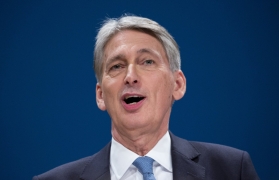Archived article
Please note that tax, investment, pension and ISA rules can change and the information and any views contained in this article may now be inaccurate.

The pledge by Chancellor Philip Hammond in his Autumn Statement on 23 November to cut corporation tax from 20% to 17% by 2020 is positive for equities.
The money that listed companies will save on tax could be used to hire more staff which could boost productivity. Firms could also pay higher dividends or accelerate debt repayments.
‘The corporation tax cut will be a positive initiative for a number of reasons: domestic companies will see the benefit to cash flow and higher earnings per share, while the UK will become a more attractive environment for overseas investors,’ says fund manager Paul Mumford of Cavendish Asset Management.
NEW SAVINGS BOND
The Government’s decision to launch a new savings bond also acts as a reminder that equities can provide more generous levels of income than cash accounts.
The new bond will pay 2.2% gross interest on a three-year term. That is attractive versus best buy cash accounts at present but pales in comparison to the 4% yield you can get from many companies on the stock market.
INFRASTRUCTURE BENEFICIARIES
The Autumn Statement fleshed out a pledge by the Government to boost spending on infrastructure, from better transport links to more efficient telecom networks.
We see several beneficiaries from this announcement. Engineering services specialist Renew Holdings (RNWH:AIM) could get a boost from both rail and land remediation work.
The Government wants to test digital signalling on the UK rail network and squeeze more capacity out of existing rail infrastructure. That could favour Tracsis (TRCS:AIM) whose skills include the monitoring of technology systems used on the rail network.
CityFibre Infrastructure (CIT:AIM) looks interesting amid a desire by the Chancellor to improve UK network speed and reliability. The small cap designs, builds and operates pure-fibre networks.
KEY MOVERS FOLLOWING THE AUTUMN STATEMENT
Estate agents were under pressure as the Chancellor confirmed plans to ban upfront lettings fees, a key source of their revenue. Foxtons’ (FOXT) shares fell nearly 15%.
Insurers dipped on news that insurance premium tax will go up from 10% to 12% from June 2017. Admiral (ADM) led the way with a 1.5% decline.
The £2.3bn allocated to housing infrastructure and £1.5bn to affordable homes failed to impress investors in the housebuilding sector with Redrow (RDW) seeing the biggest fall, down 1.8%. Low cost housing specialist MJ Gleeson (GLE) was the exception, up 3.2% to 562.5p.

This article is provided by Shares Magazine. Shares publishes information and ideas which are of interest to investors. It does not provide advice in relation to investments or any other financial matters and does not guarantee the accuracy or completeness of the information in this article.
Investors acting on the information in this article do so at their own risk and AJ Bell Media Limited and its staff do not accept liability for losses suffered by investors as a result of their investment decisions. Shares is published by AJ Bell Media Limited part of AJ Bell.